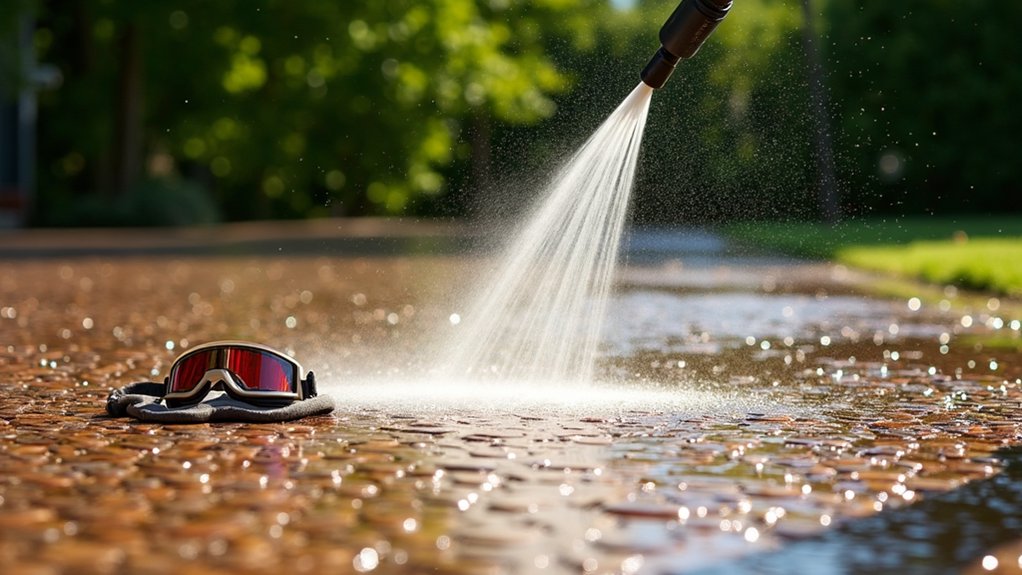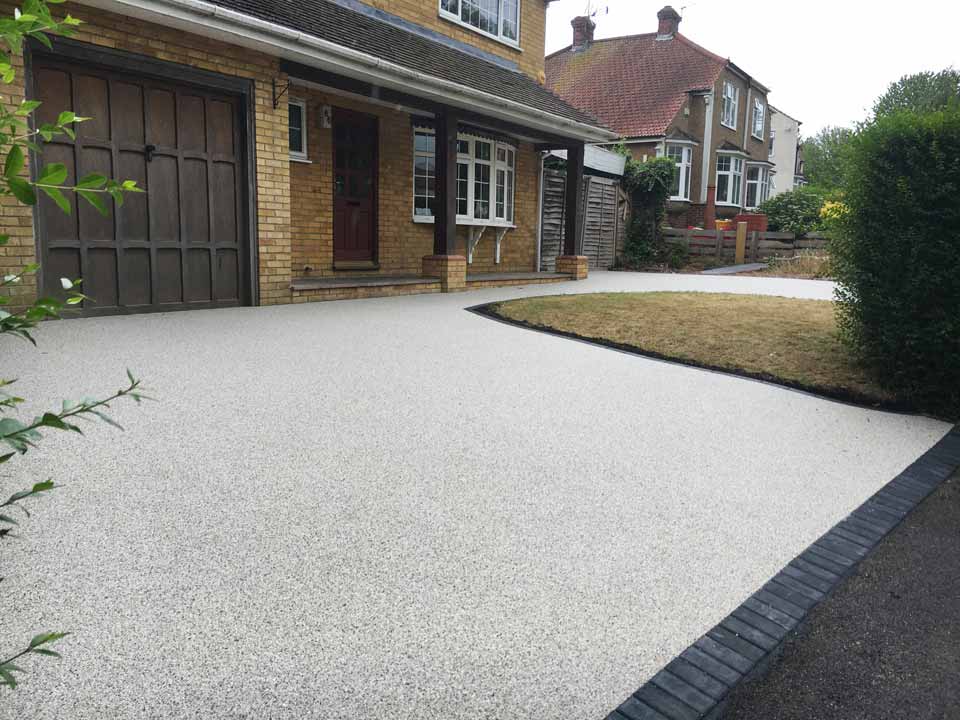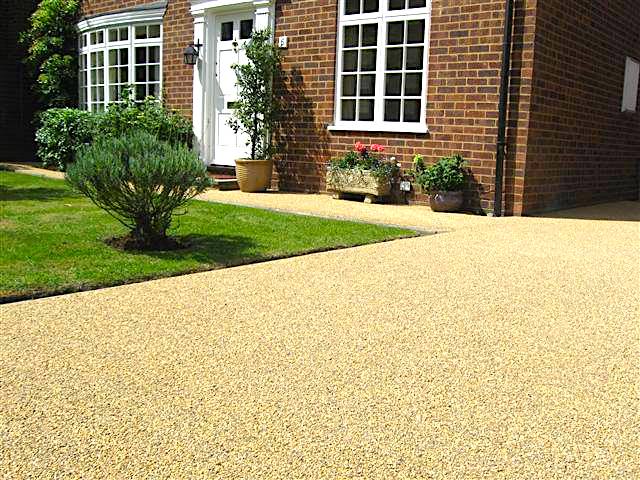Yes, you can pressure wash a resin driveway, but it’s important to take care. Always wear safety gear such as goggles and gloves. Select a pressure washer with a pressure setting between 1,000 and 2,500 psi, and use a 25-degree nozzle to prevent damage. Maintain a distance of 30–45 cm from the surface and use cool water. Regular upkeep is essential; steer clear of harsh chemicals, and keep an eye out for cracks or stains that might need professional attention. For more effective techniques and tips, consider doing further research.
Table of Contents
ToggleKey Takeaways
Yes, you can pressure wash a resin driveway, but it’s essential to use low to medium pressure settings (1,000 to 2,500 psi) to avoid causing damage.
Always wear safety goggles, gloves, and waterproof boots to protect yourself from debris and water splashes during the cleaning process.
Choose the right nozzle: a 25-degree nozzle is ideal for general cleaning, while a 40-degree nozzle is better for more delicate areas. Maintain a distance of 30–45 cm from the surface while washing.
Opt for pH-neutral detergents, such as mild dish soap, and steer clear of harsh chemicals that could harm the resin.
Regularly check for cracks and weak spots—ideally once a month. If you notice any significant damage or persistent stains that regular cleaning doesn’t resolve, it’s wise to consult a professional.
Importance of Safety Precautions
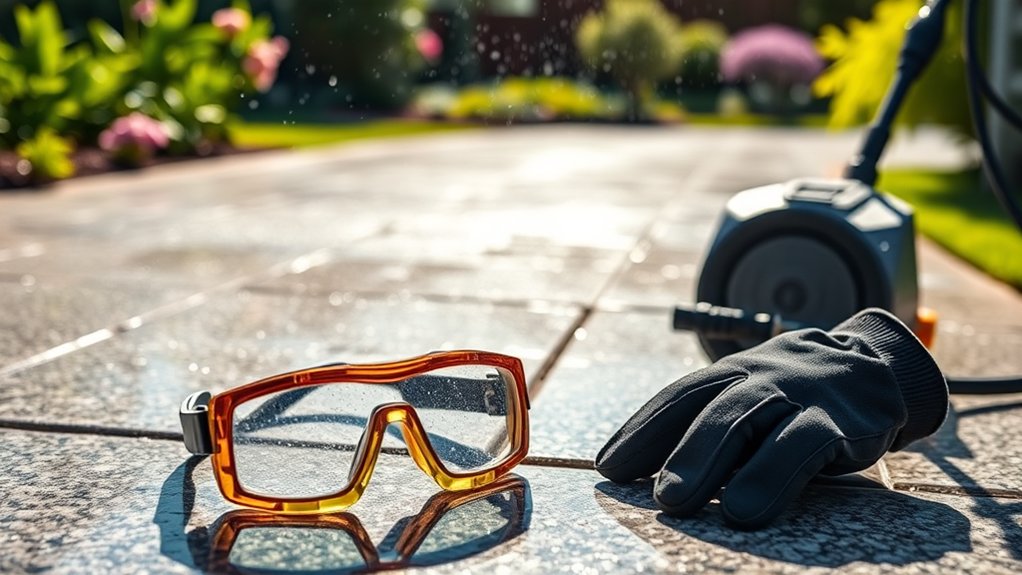
When pressure washing a resin driveway, safety should be your top priority to protect yourself and ensure effective cleaning.
Start by wearing suitable safety gear, such as safety goggles, gloves, and waterproof boots, to guard against injuries and chemical exposure. Clear the area of any obstacles to allow for safe movement while cleaning. It’s also important to remember that regular maintenance is key to preserving the driveway’s appearance and integrity.
Ensure you adjust the pressure settings to a maximum of 150 bar to avoid damaging the resin surface, and always test the pressure on a small, hidden area first. Additionally, remember that resin driveways are highly durable, allowing for effective cleaning without compromising the surface.
Lastly, steer clear of harsh chemicals, as these can damage the resin.
Choosing the Right Equipment
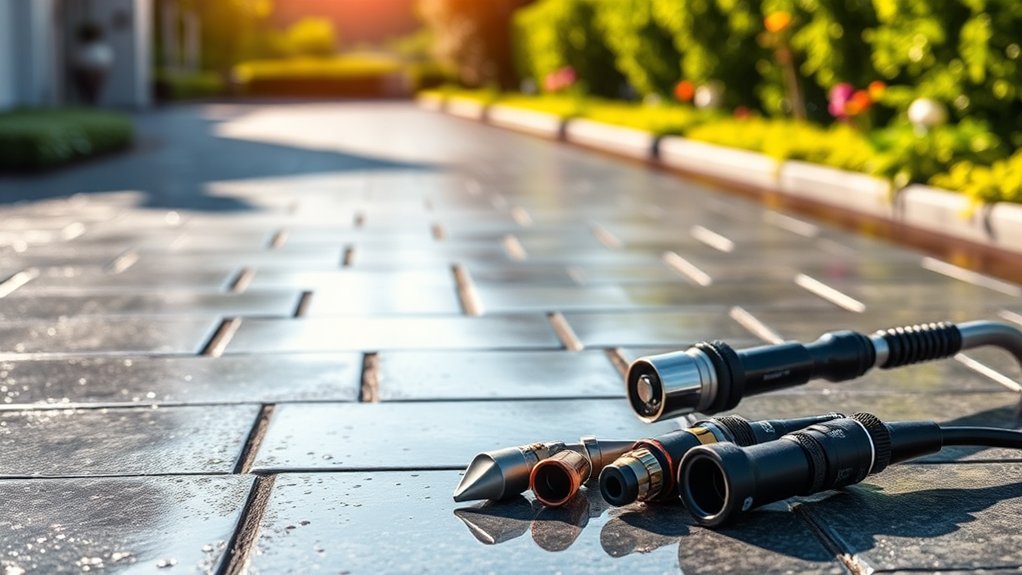
Choosing the right equipment is crucial for effectively pressure washing a resin driveway. Start with a pressure washer that has adequate motor power, such as the Honda GX630, to clean resin surfaces without causing damage. Aim for a flow rate of around 30 litres per minute (LPM) to ensure thorough cleaning without excessive pressure. Using a surface cleaner is also important, as it helps distribute pressure evenly across larger areas, making the job more efficient. Additionally, consider using new units for flow meters, as they can significantly enhance the cleaning process. Always check that your equipment is compatible with your pressure washer to avoid any damage and ensure optimal performance. Regular maintenance is key to keeping your equipment in good condition, as proper maintenance can prolong the lifespan of both your driveway and cleaning equipment.
Selecting the Appropriate Nozzle Type
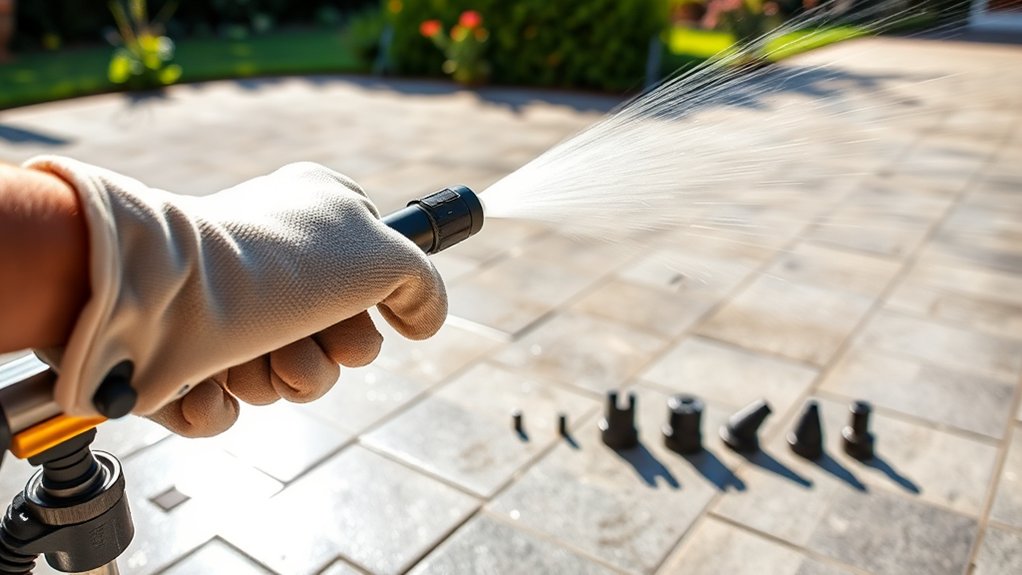
When pressure washing your resin driveway, it’s crucial to choose the right nozzle type to ensure effective cleaning without causing damage. Different nozzle angles create varying spray patterns, which influence both the pressure and coverage. For instance, a 25-degree nozzle is ideal for removing stubborn stains, while a 40-degree nozzle provides a wider spray for general cleaning. Smaller degrees create thinner streams that deliver higher pressure, making them suitable for tougher messes. Selecting the correct nozzle will help you tackle tough marks while maintaining the integrity of your driveway. Additionally, using a pressure washer with a maximum of 150bar pressure is essential to prevent surface damage.
Nozzle Angle Importance
Choosing the right nozzle angle is crucial for cleaning a resin driveway without causing harm. The correct type and spray width can significantly impact the driveway’s surface.
| Nozzle Angle | Recommended Use |
|---|---|
| 15° | High pressure; not suitable for resin |
| 25° | Ideal for resin driveways |
| 40° | Safe for delicate surfaces |
Opting for a 25° or 40° nozzle reduces concentrated force, minimising the risk of damaging the resin matrix. Wider angles spread the water, aiding in preserving the surface finish while ensuring effective cleaning. Always test the nozzle on a small area first and maintain a distance of 30–45 cm for the best results. Choosing the right nozzle angle can extend your driveway’s lifespan and keep it looking its best.
Spray Pattern Effects
The spray pattern you choose is crucial for cleaning a resin driveway without causing damage. A wide spray pattern is best, as it evenly spreads pressure, reducing the risk of harm.
Opt for a fan nozzle to ensure balanced pressure across the surface. Avoid turbo nozzles, as they concentrate pressure in a small area and can damage the resin.
Keep a consistent distance from the surface to avoid uneven cleaning or marks. Always test a small area first to check for any adverse effects.
Choosing the Right Nozzle
Choosing the right nozzle is crucial for effectively cleaning your resin driveway without causing damage. Here are your options based on cleaning needs:
| Nozzle Type | Best For | Key Considerations |
|---|---|---|
| Rotary Nozzles | Thorough cleaning | Balances pressure and coverage |
| Standard Nozzles | Versatile spray angles | May lack broad coverage |
| Turbo Nozzles | Efficient area coverage | High pressure for quick cleaning |
Make sure the nozzle is compatible with your pressure washer’s PSI and GPM to prevent damage. Regular maintenance, such as inspecting and cleaning nozzles, will improve performance and extend their life. Choose wisely to protect your driveway while achieving great results!
Understanding Pressure Settings
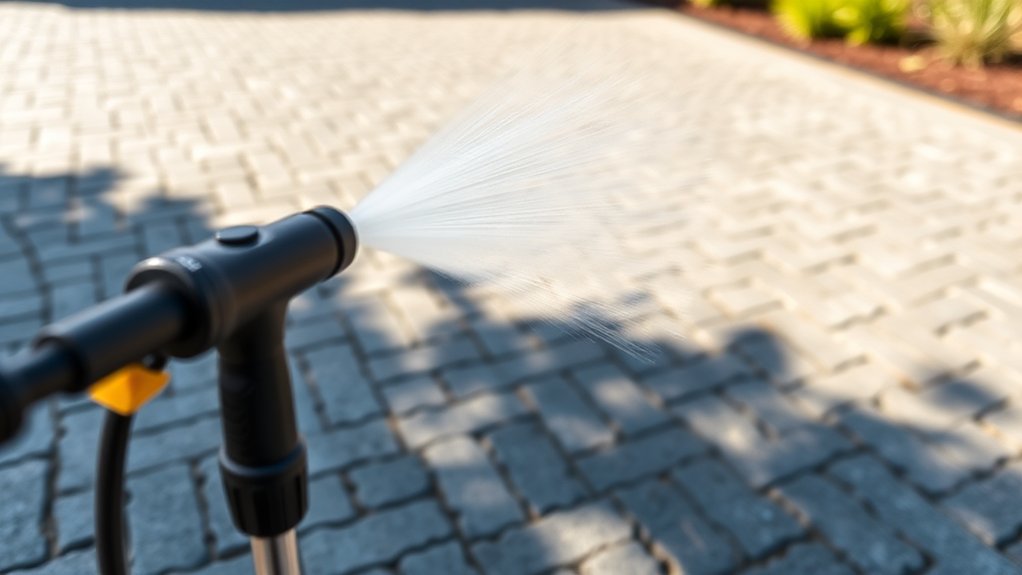
When pressure washing a resin driveway, it’s essential to use the right pressure settings to prevent damage. Set your pressure washer between 1,000 and 2,500 psi (or up to 150 bar). Excessive pressure can dislodge resin or cause cracks, so adjust carefully.
Opt for wide-angle nozzles, such as 25-degree or 40-degree, to distribute the water pressure evenly, and maintain a distance of at least 20 to 40 cm from the surface.
Begin with a lower pressure to see how the surface reacts before gradually increasing it. This approach ensures you clean your driveway effectively without harming the resin.
Inspecting Your Driveway Before Washing
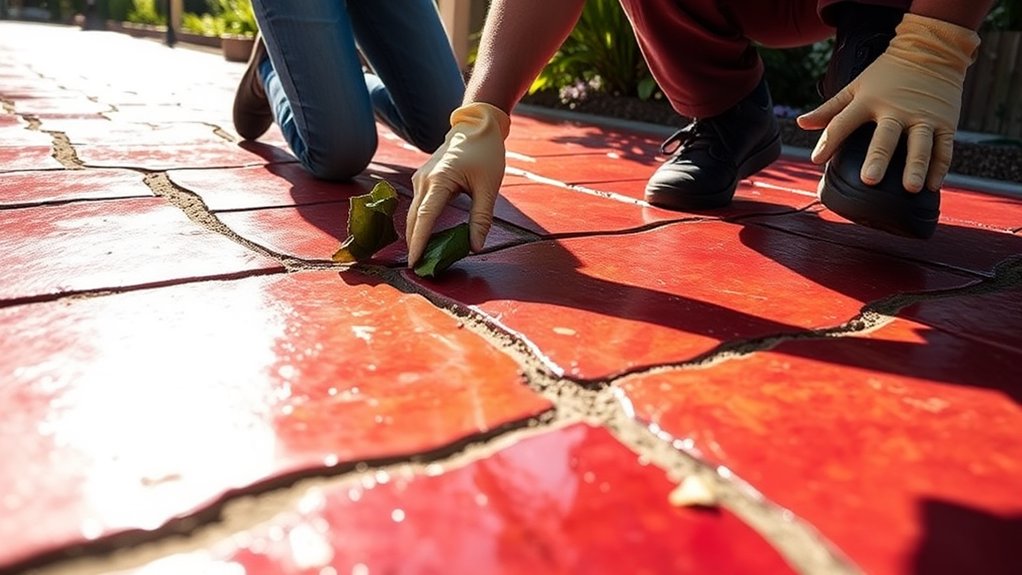
Before you begin pressure washing your resin driveway, it’s important to inspect its condition carefully.
Start by clearing away any debris, such as leaves and twigs; this prevents staining and allows for a better inspection.
Next, check for any damage—look for cracks or other issues that could worsen during washing.
Don’t overlook weeds; inspect the joints for any growth, as their roots can cause damage over time.
Also, take note of any stains, like oil spills, that may need prompt attention.
Finally, assess the overall surface condition to decide on the best cleaning approach, ensuring your driveway stays in excellent shape.
Effective Cleaning Techniques
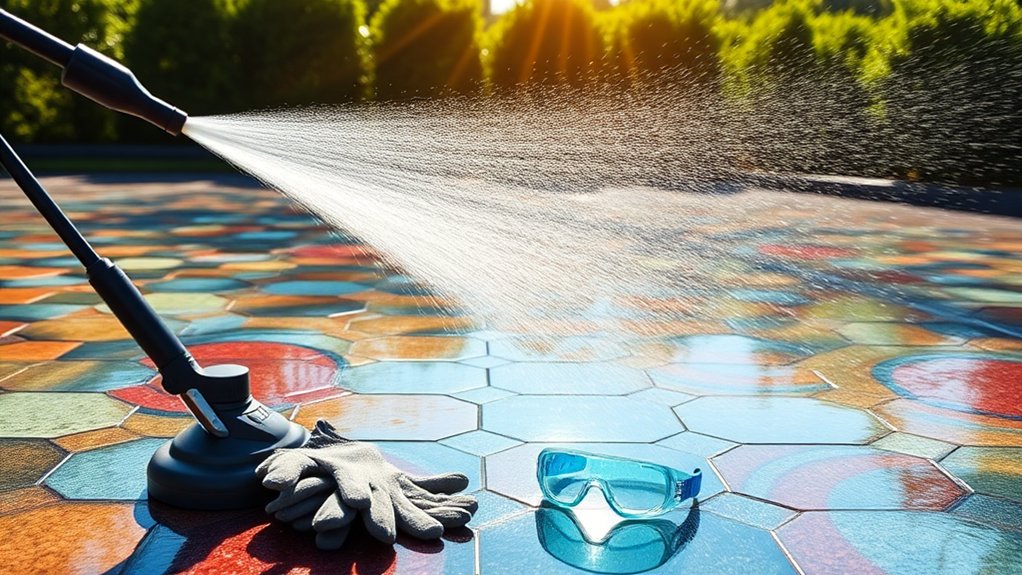
When pressure washing your resin driveway, it’s important to use cool water to avoid thermal damage.
Use broad sweeping motions to effectively remove dirt and debris without risking harm to the surface.
Proper Water Temperature
Using the correct water temperature is vital for cleaning your resin driveway effectively without causing damage.
Choose cool water, but not too cold, as very cold water can harm the resin surface. A moderate temperature prevents thermal stress, maintaining the integrity of your driveway.
Avoid extreme temperatures; hot water can degrade the resin, reducing its durability. A stable temperature range improves cleaning efficiency, helping you achieve the best results.
Always check the weather before pressure washing; it’s best to avoid particularly cold days.
Sweeping Motion Technique
The sweeping motion technique is crucial for cleaning your resin driveway without causing damage. For effective cleaning, use wide-angle or fan nozzles to distribute pressure evenly.
Maintain a distance of 30 to 45 centimetres to prevent harm to the resin. It’s important to operate at low to medium pressure settings, ideally not exceeding 150 bar, to protect your driveway.
Before you start pressure washing, clear away leaves and debris to ensure a smooth process, and check for any cracks. This preparation will help you achieve the best results with your sweeping technique.
Recommended Cleaning Solutions
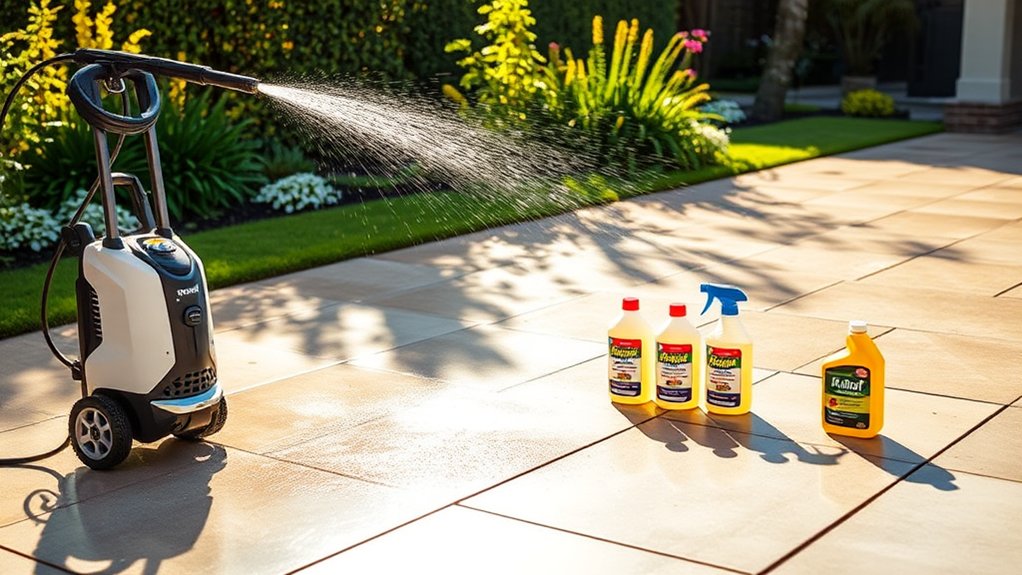
For effective cleaning of your resin driveway, use pH-neutral detergents like mild dish soap. These gentle solutions protect the resin from damage, unlike harsh chemicals such as bleach. Eco-friendly products are also a good choice, as they’re safer for the environment and your pets.
When using specialised cleaners like Essential Algae Remover, always follow the manufacturer’s instructions for the best results.
Regular cleaning is essential; sweep and scrub with a stiff brush to prevent dirt buildup. Avoid high-pressure washing, as this can damage the resin bond. Instead, utilise a garden hose for low-pressure rinsing.
Common Mistakes to Avoid
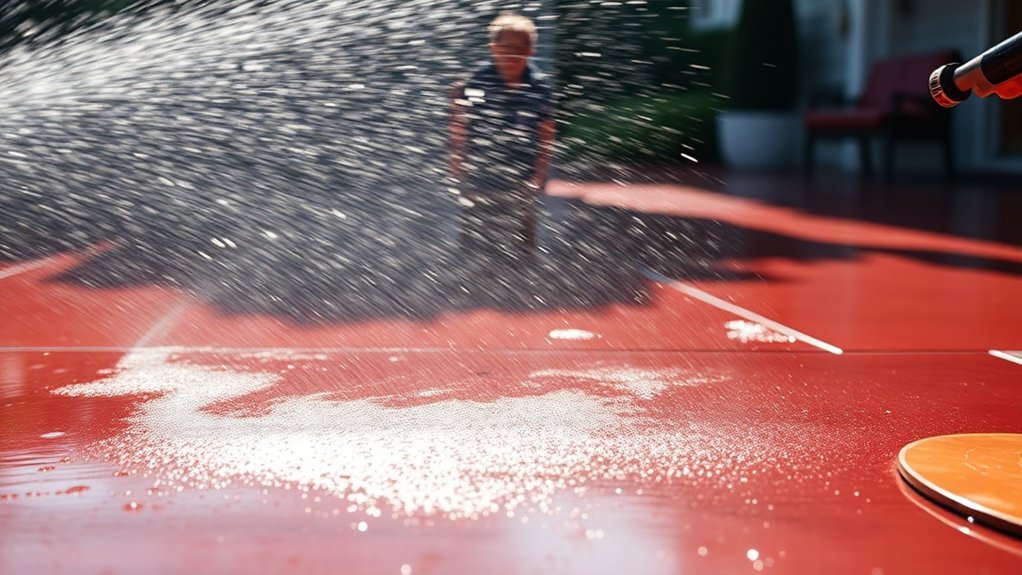
Pressure washing your resin driveway can produce excellent results, but there are common pitfalls to avoid.
Firstly, ensure you use the correct pressure settings; too high can damage the surface, while too low may leave dirt behind.
Secondly, pay attention to your nozzle choice—using the wrong type or holding it too close can lead to etching or uneven cleaning.
Always keep the nozzle moving to prevent damage from concentrated pressure.
Remember to clear the area of debris before you start.
Lastly, wear protective gear to shield yourself from flying debris and water splash.
Best Practices for Maintenance
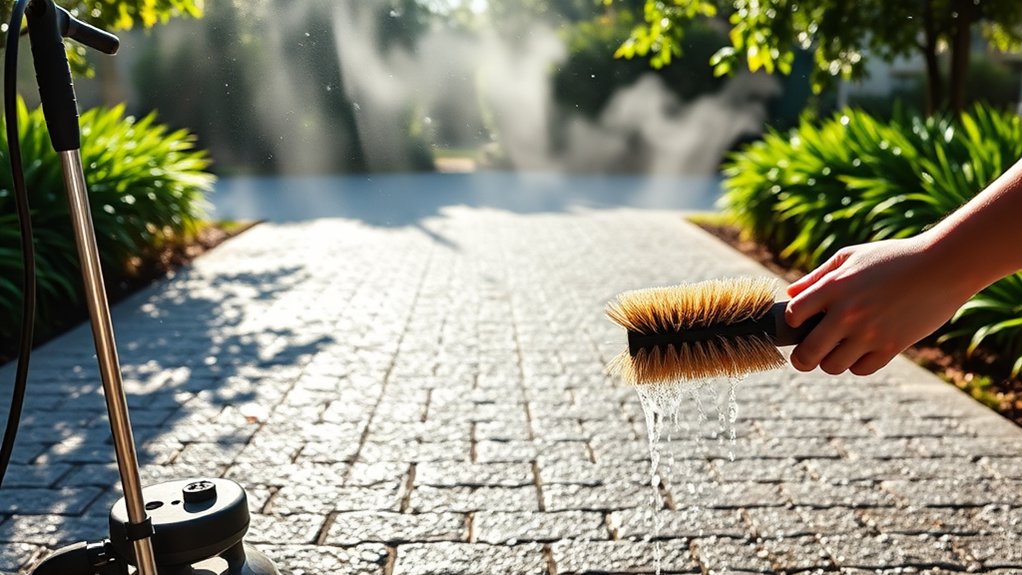
Maintaining your resin driveway is essential for its longevity and appearance. Focus on regular cleaning and inspections to keep it in top shape. Here’s a straightforward maintenance schedule:
| Task | Frequency | Purpose |
|---|---|---|
| Regular Sweeping | Weekly | Remove debris and prevent stains |
| Seasonal Cleaning | Every Season | Tackle leaf stains and dirt |
| Crack Inspection | Monthly | Spot potential weed growth |
| Stain Treatment | As Needed | Prevent permanent marks |
Use mild detergents and soft brushes for cleaning, and rinse thoroughly afterwards. During the summer months, consider applying a UV-resistant sealant for added protection. By following these simple practices, you can ensure your driveway stays in excellent condition for years to come.
When to Seek Professional Help
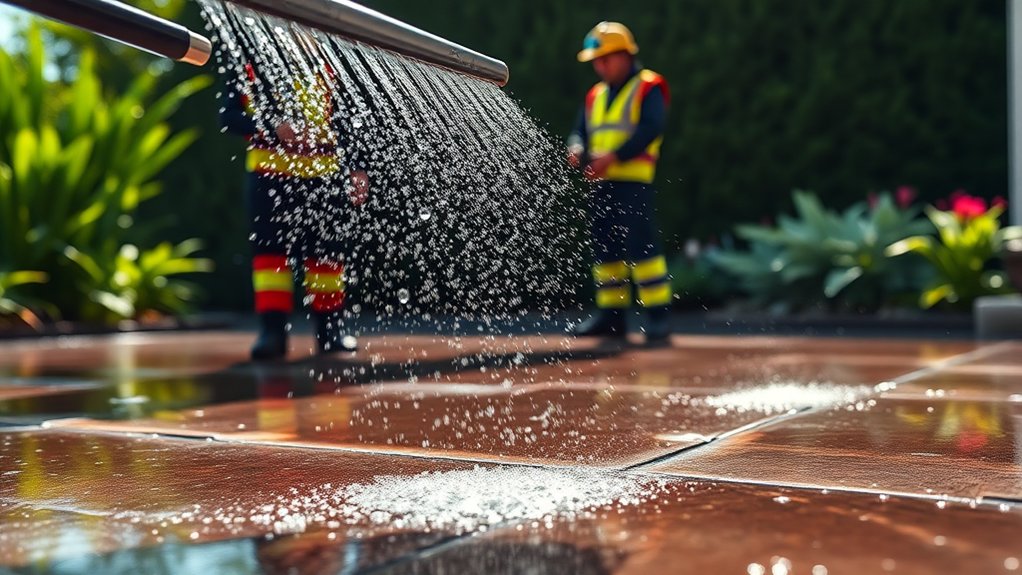
If you spot significant damage on your resin driveway, it’s wise to consider getting professional help to avoid further complications.
Tackling complex stain issues without the right experience can lead to costly errors. By consulting experts, you can ensure you receive effective solutions without risking additional damage or safety concerns.
Severe Damage Assessment
When assessing severe damage to your resin driveway, it’s crucial to recognise the signs that indicate the need for professional assistance.
Here are some key indicators to watch for:
- Discolouration: Noticeable changes in colour due to excessive pressure.
- Cracking: Surface cracks appearing after cleaning, which may signal deeper structural problems.
- Weak Spots: Areas that feel unstable and could worsen over time.
- Jointing Sand Loss: Significant loss of sand can compromise the driveway’s stability.
- Material Displacement: Signs of resin material becoming loose or shifting.
Conduct visual inspections and check the condition of the jointing sand regularly.
If you notice any of these issues, it’s wise to contact a professional to prevent further damage and ensure your driveway lasts.
Lack of Experience
Recognising severe damage to your resin driveway raises the question: should you clean it yourself or call in professionals?
If you’re unsure about pressure settings or don’t know what protective gear to use, it’s best to get expert help. DIY cleaning can risk damaging the resin surface with high pressure or incorrect chemicals, and without proper preparation, you mightn’t achieve good results.
Professionals have the experience and equipment to tackle these issues safely and effectively. They can also provide valuable advice for long-term maintenance, keeping your driveway in great shape.
When in doubt, prioritise safety and quality by hiring the experts.
Complex Stain Issues
Complex stain issues can be a real headache, particularly when they compromise the look and integrity of your resin driveway.
It’s important to recognise when it’s time to call in the professionals. Look out for these indicators:
- Stains that persist even after a thorough clean.
- Cracks or lifting in the resin.
- Large or multiple deep-set stains.
- Presence of hazardous substances like oil or chemicals.
- Previous attempts to remedy the stains have failed.
Identifying the type of stain and using the right cleaning solutions is crucial to avoid damaging your driveway.
Professionals possess the necessary skills and equipment to tackle tough stains safely. Ignoring these problems can lead to expensive repairs or irreversible damage, so don’t hesitate to seek expert help when required.
Ensuring the longevity of your driveway depends on it!
Frequently Asked Questions
How Often Should I Pressure Wash My Resin Driveway?
You should pressure wash your resin driveway at least once a year. However, if you live in an area with heavy rain, snow, or high foot and vehicle traffic, you may need to clean it more often. For instance, if your driveway collects a lot of leaves or mud, a seasonal wash could help maintain its appearance and durability.
Can I Use Hot Water for Pressure Washing?
Using hot water may seem appealing, but it can damage your resin driveway. It’s best to use cool water instead. Adjust your pressure washer settings to avoid any harm and ensure your driveway remains in good condition.
Will Pressure Washing Damage the Resin Color?
Pressure washing can cause colour fading if you use too much pressure or the wrong nozzles. To protect your resin, stick to the recommended settings and techniques. This will help maintain the surface’s integrity and keep its vibrant colour. For example, a gentle approach with a wide nozzle is often best for preserving the finish.
What Should I Do if My Driveway Has Stubborn Stains?
Got stubborn stains on your driveway? For effective removal, try a mild soap solution or a degreaser. Regular maintenance, such as sealing and cleaning, can help prevent future stains and keep your driveway looking its best.
Is It Safe to Pressure Wash in Cold Weather?
Pressure washing in cold weather can be safe, provided you steer clear of icy conditions. Use cool water, check the weather forecast, and ensure the surface is free from debris to avoid slips and ensure effective cleaning. For example, if you’re cleaning a patio, make sure it’s dry and clear of leaves or frost to maintain safety.
Conclusion
Now that you’re aware of the dos and don’ts of pressure washing your resin driveway, you can approach the task with assurance. However, be cautious—one misstep could result in costly damage or a dangerously slippery surface. Will you take the right precautions to safeguard your investment? By adhering to these guidelines and regularly maintaining your driveway, you can ensure it remains in excellent condition for years to come. So, are you ready to make your driveway shine?
Whilst it is true that there are certain conditions required in order to lay a resin bound stone patio, pathway Read more
If your driveway is looking old and tired, a new one can help revamp your property. Modern driveways are available Read more
APPROVED RESIN BOUND DRIVEWAY INSTALLERS LOCAL TO YOU! Find out More Get in Touch Get a Free Quote Book an Read more

